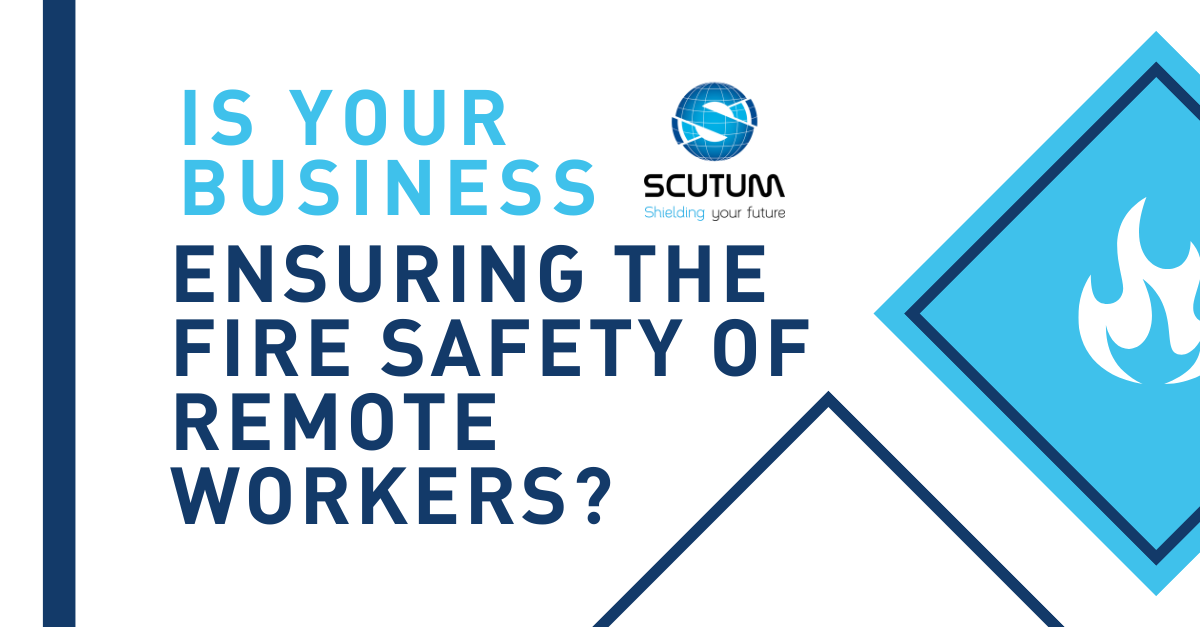
Is your business ensuring the fire safety of remote workers?
The rise of flexible working patterns has led to an unprecedented level of freedom for employees and businesses alike, offering workers more control over the way they operate and providing companies access to a greater pool of potential talent. However, this increased flexibility also brings with it a certain set of risks – most notably, threats to safety.
With more organisations than ever before allowing staff members to work remotely, there is a growing need for companies to consider how their existing policies may need to be adapted in order to safeguard against potential dangers.
“By law, employers must conduct a ‘suitable and sufficient’ risk assessment of their employees’ working environment.” ACAS
Employers have an obligation of home safety for remote workers and fire hazards although non specified, should form part of this risk assessment. Ensuring any home office setup meets fire safety standards, should be a key focus. Additionally, educating staff members on the importance of taking preventative measures such as installing smoke alarms or properly extinguishing any open flames should be a primary consideration when setting up. Furthermore, businesses should also consider providing employees with access to resources like informational videos or educational material which can help them be aware of the risks associated with working remotely.
One such hazard that many do not consider is the use of lithium-ion laptop batteries. Although a regular feature already in homes, it’s important to know and understand the risks associated with them. For example, it’s essential that these types of batteries are stored properly to avoid overheating or potential explosions; this includes avoiding leaving them in direct sunlight or on any hot surfaces for extended periods of time. It’s also important to keep an eye out for any warning signs that a battery may be malfunctioning such as bulging sides or a crackling sound coming from the device – if you suspect there may be a problem then you should contact a qualified technician immediately.
“Laptop batteries are only part of the story, companies also give employees tablets, phones and measuring instruments that are all lithium-ion powered. Also, one of the biggest issues when swapping between home and work is poor charging discipline such as using the incorrect chargers or just leaving the device permanently plugged in, both of which are significant risks.” Shares General Manager for Scutum London, Alan Lansdell, who’s expertise on Lithium-ion is much relied on by both industry and clients.
Although according to the Health and Safety Executive, employers are only responsible for electrical equipment provided to carry out remote working, there is still a direct risk to employees and employer provided equipment if relevant fire safety measures aren’t in place in the working environment, wherever that may be.
Employers should strongly consider providing fire prevention measures to remote workers to protect their staff and their property. Fire prevention measures can provide a fast, efficient, and effective way to quickly detect and extinguish any potential fires before they can spread, causing significant damage or injury to your employee, employee’s home, and your equipment. Furthermore, providing employees with access to such measure would also give them peace of mind knowing that they are protected in the event of an emergency. Ultimately, employers should strive to ensure that their remote workers are always kept safe from fire-related hazards; investing in fire prevention measure is one way to do just that.
“We should all be considering the Lithium-ion batteries we have in our phones, tablets, toothbrushes, e bikes, e scooters, cigarettes etc. It could be considered that employees may think they are prepared for this risk, but the employer should also check the suitability of these precautions to be sure.” Alan continues.
Companies should also conduct frequent check-ins with remote staff to ensure they are following safety protocols and understand how to identify potential fire risks in the home. Ultimately, by staying vigilant and proactive when it comes to promoting fire safety; employers can ensure their remote workers always remain protected
It’s clear that when it comes to managing flexible working practices; businesses must recognise and address both the benefits and risks associated with remote employees if they want to ensure overall safety within their organisation. By understanding how these new changes may affect workers’ wellbeing; employers can continue leveraging new technologies while guaranteeing optimal safety standards are met throughout their workforce.
